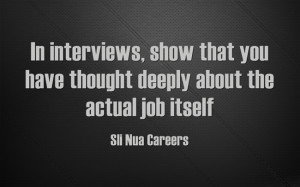By Liam Horan, Career Coach & Managing Director, Sli Nua Careers Ltd
Q: I’m going for interview next week and have a lot of preparation done. At this stage, I think I know more about the company than the CEO herself does. One query: what do I ask at the end of the interview when they invite me to put a question or two to them. I don’t want to waste that time? (AD, email).

A: Your instinct is correct – ideally, every minute of the interview should be put to good use. I define ‘good use’ as contributing to your campaign to convince the interviewer that you are the right person for the job. ‘Good use’ can be subtle at times, but it must always be your guiding principle.
My advice is to ask questions that achieve one or all of the following aims:
- Illustrate your desire to do the job;
- Exhibit how your experience, achievements, training, education, competencies and attributes qualify you for the job;
- Show the employer that you have thought deeply about the hiring company – what they do, the challenges they face, the opportunities that exist, including, perhaps, opportunities they might not have thought of themselves;
- Show that you have thought deeply about the actual job itself;
- Get the interview panel talking animatedly about their organisation.
 A good question at the end can set them talking and, if your question is really on the money, it can lead to a knowledgeable chat, and that is a terrific point to reach during an interview.
A good question at the end can set them talking and, if your question is really on the money, it can lead to a knowledgeable chat, and that is a terrific point to reach during an interview.
So, choose your questions carefully. Where necessary, pad the question with some support statements about yourself.
Here’s one example where the first half of the sentence is the padding and the second half is the question itself:
“I like to be fully up to speed in any role I take on – what training is provided initially on an on-going basis.”
And, using the same half and half formula:
“In previous positions I have been successful in proving my worth and going up the ladder – what opportunities exist for promotion in your organisation if I do well?”
“I like to know what is expected of me so I can meet expectations – how do you measure and review performance here?”.
It will not always be necessary to pad the question. Some standalone questions that might get them thinking and talking include:
“Down the road, how do you see this particular role evolving?”
“Where do you see growth opportunities for the company in the future – and how might the person filling this role contribute to those?”
“Where do you see the challenges for your business down the line?”
The question at the end can be used to unfurl your big idea for the role: “have you looked at…” or “something I think might work here and I would like to get your ideas on is…” or a question of that nature.
A suggestion for a new way of doing things, or a new market to target, can be very powerful in interview. The very fact that you have started to think about tangible value you can bring to this specific organisation is likely to score you some interview points – and, to paraphrase what you said at the outset, every minute of the interview should be put to good use to score you some points.
Liam Horan is a Career Coach with Sli Nua Careers Ltd. You can read more blogs from Sli Nua Careers coaches HERE, and make a booking for CV Preparation and Interview Training.